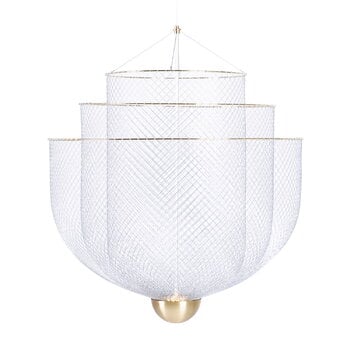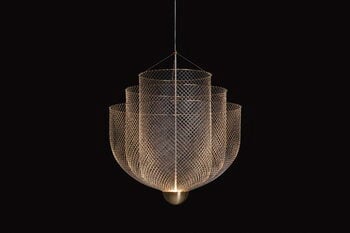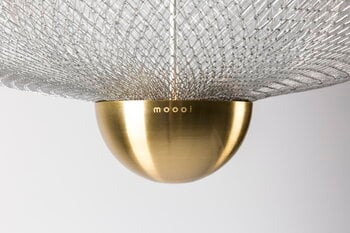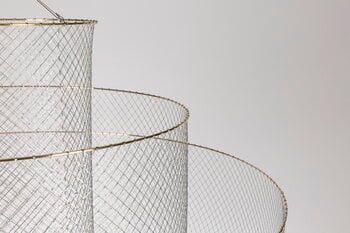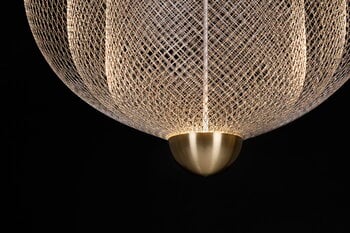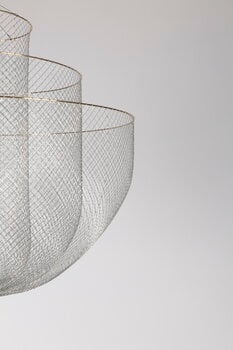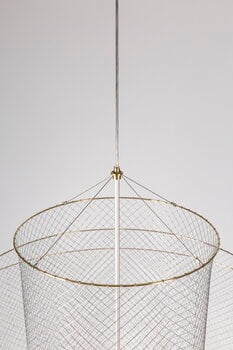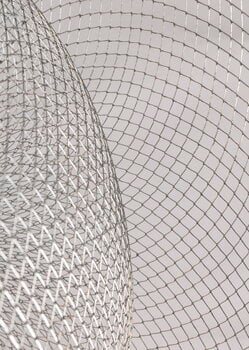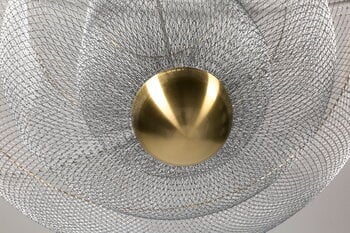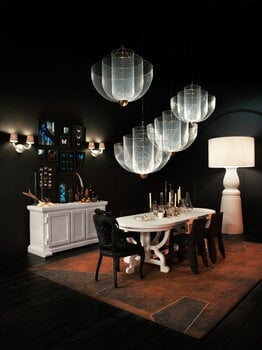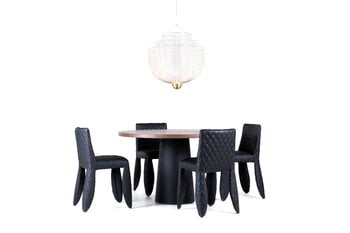The Meshmatics chandelier is an innovative luminaire designed by Rick Tegelaar. The refined, alluring design is created using a surprising material – a thin mesh wire. Tegelaar designed Meshmatics while still in school and, utilising his skills in engineering, he discovered a way of shaping and layering the humble material to create stunning chandeliers. Due to its transparent material, the elegant and enchanting Meshmatics chandelier emits a radiant, soft glow and does not create a visual block – but will surely make an impact.
Meshmatics chandelier, small
Moooi
Description
The Meshmatics chandelier is an innovative luminaire designed by Rick Tegelaar. The refined, alluring design is created using a surprising material – a thin mesh wire. Tegelaar designed Meshmatics while still in school and, utilising his skills in engineering, he discovered a way of shaping and layering the humble material to create stunning chandeliers. Due to its transparent material, the elegant and enchanting Meshmatics chandelier emits a radiant, soft glow and does not create a visual block – but will surely make an impact.
Product details (20)
- Material
- Galvanised steel, brass
- Colour
- Steel
- Width
- 58 cm
- Diameter
- 58 cm
- Height
- 58 cm
- Light source
- Fixed 12W LED. The LED module is replaceable.
- Colour temperature
- 2,700 K
- Luminous flux
- 388 lm
- Lifetime
- 50,000 h
- IP rating
- 20
- Voltage
- 220–240 V
- Nominal frequency
- 50–60 Hz
- Certifications and labels
- CE marked: tested and approved according to European standards
- Cable length
- 250 cm
- Cable colour
- Transparent
- Weight
- 2.4 kg
- Canopy
- Yes: diameter 16 cm
- Ceiling plug
- No
- Dimmable
- Yes
- Notes
-
LED module available as a spare part
from the manufacturer.
- Product ID
Designer
Rick Tegelaar (b. 1986) is known as a material-oriented designer who creates original, distinctive products using unusual and undervalued materials as his starting point. Tegelaar graduated in 2011 as a product designer from the ArtEZ University in Arnhem. Having originally studied engineering, his works are often characterised by innovative approaches to materials and techniques.
View all productsReviews (0)
Sustainability
The Product Sustainability Framework, our criteria of sustainable design, helps you find the most sustainable products in our selection. Read below which sustainability criteria this product has met.
Working conditions & labour 9/9
-
Equal opportunities for all employees
-
Commitment to UN Global Compact, fair compensation for all employees
-
Corporate responsibility requirements defined and communicated for suppliers
-
Systematic work for improved inclusion and well-being in the workplace
-
Transparent supply chain
-
Suppliers' compliance to a code of conduct ensured
-
Direct suppliers audited and certified
-
Compliance to the UN Guiding Principles on Business and Human Rights ensured in the supply chain
-
Support for community involvement in the supply chain
Eco-friendly production 7/9
-
Fair and resource-wise water-use in production
-
No incineration or landfilling of returned items
-
No use of endangered species as materials
-
No direct environmental emissions or waste (excl. GHGs) from production
-
The sustainability of direct suppliers' production is addressed and monitored
-
Material-efficient and ecological packaging
-
No potentially harmful chemicals used in own production
Climate impact 3/8
-
Company's direct greenhouse gas emissions identified and commitment to reduction
-
Product's carbon impact identified and commitment to reduction
-
Guidance on energy- and eco-efficient use of the product
Sustainable materials 5/6
-
Sustainable and long-lasting material choices
-
No harmful or hazardous substances
-
Responsible raw material sourcing and production
-
Materials suited for circularity: monomaterials, recyclable finishings, renewable or recycled contents etc.
-
Ecological materials: natural, biodegradable, recyclable or recycled contents
Circular design 5/5
-
High aesthetic quality promoting long-term use of the product
-
Technically durable product design and material choices
-
Design for enduring life-long quality
-
Design and support for product maintenance, repair and upgradability
-
Innovative circular design solutions: circular service system, resale platform, remanufacturing, collection of used products, etc.

